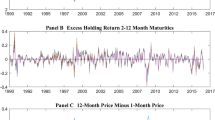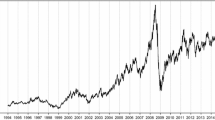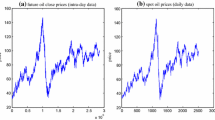Abstract
In this paper, we examine the weak-form efficient market hypothesis of crude oil futures markets by testing for the random walk behavior of prices. Using a method borrowed from statistical physics, we find that crude oil price display weak persistent behavior for time scales smaller than a year. For time scales larger than a year, strong mean-reversion behaviors can be found. That is, crude oil futures markets are not efficient in the short-term or in the long-term. By quantifying the market inefficiency using a “multifractality degree”, we find that the futures markets are more inefficient in the long-term than in the short-term. Furthermore, we investigate the “stylized fact” of volatility dynamics on market efficiency. The simulating and empirical results indicate that volatility clustering, volatility memory and extreme volatility have adverse effects on market efficiency, especially in the long-term.
Similar content being viewed by others
References
Alvarez-Ramirez J., Alvarez J., Rodriguez E. (2008) Short-term predictability of crude oil markets: A detrended fluctuation analysis approach. Energy Economics 30: 2645–2656
Alvarez-Ramirez J., Alvarez J., Solis R. (2010) Crude oil market efficiency and modeling: Insights from the multiscaling autocorrelation pattern. Energy Economics 32: 993–1000
Baillie R. T., Bollerslev T., Mikkelsen H.-O. (1996) Fractionally integrated generalized autoregressive conditional heteroskedasticity. Journal of Econometrics 74: 3–30
Bollerslev T. (1986) Generalized autoregressive conditional heteroskedasticity. Journal of Econometrics 31: 307–327
Carbone A., Castelli G., Stanley H. E. (2004) Analysis of clusters formed by the moving average of a long-range correlated time series. Physical Review E 69: 026105
Charles A., Darne O. (2009) The efficiency of the crude oil markets: Evidence from variance ratio tests. Energy Policy 37: 4267–4272
Cont R. (2001) Empirical properties of asset returns: Stylized facts and statistical issues. Quantitative Finance 1: 223–236
Cunado J., Gil-Alana L. A., De Gracia F. P. (2010) Persistence in some energy futures markets. The Journal of Futures Markets 30: 490–507
Dickey D. A., Fuller W. A. (1979) Distribution of the estimators for autoregressive time series with a unit root. Journal of the American Statistical Society 75: 427–431
Elder J., Serletis A. (2008) Long memory in energy futures prices. Review of Financial Economics 17: 146–155
Engle R. F. (1982) Autoregressive conditional heteroskedasticity with estimates of the variance of United Kingdom inflation. Econometrica 50: 987–1007
Fama E. (1970) Efficient capital markets: A review of theory and empirical work. The Journal of Finance 25: 383–417
Fama E. (1991) Efficient capital markets: II. Journal of Finance 46: 1575–1617
Fernandez V. (2010) Commodity futures and market efficiency: A fractional integrated approach. Resources Policy 35: 276–282
Gu G.-F., Zhou W.-X. (2010) Detrending moving average algorithm for multifractals. Physical Review E 82: 011136
Hamilton J. D. (2009) Understanding crude oil prices. Energy Journal 30: 179–206
Hurst H. E. (1951) Long term storage capacity of reservoirs. Transactions American Society of Civil Engineers 116: 770–808
Kantelhardt J. W., Zschiegner S. A., Koscielny-Bunde E., Havlin Sh., Bunde A., Stanley H. E. (2002) Multifractal detrended fluctuation analysis of nonstationary time series. Physica A 316: 87–114
Lo A. W. (1991) Long term memory in stock market prices. Econometrica 59: 1279–1313
Lo A. W. (1997) Market efficiency: Stock market behaviour in theory and practice. Volume I and II. An Elgar Reference Collection, Chethenham, UK
Maslyuk S., Smyth R. (2008) Unit root properties of crude oil spot and futures prices. Energy Policy 36: 2591–2600
Peng C. K., Buldyrev S. V., Simons M., Stanley H. E., Goldberger A. L. (1994) Mosaic organization of DNA nucleotides. Physical Review E 49: 1685–1689
Peters E. (1991) Chaos and order in the capital market. Wiley, New York
Peters E. (1994) Fractal market analysis: Applying chaos theory to investment and economics. Wiley, New York
Phillips P. C. B., Perron P. (1988) Testing for a unit root in time series regressions. Biometrica 75: 335–346
Robinson P. M. (1995) Gaussian semiparametric estimation of long range dependence. Annals of Statistics 23: 1630–1661
Serletis A. (1992) Unit root behavior in energy futures prices. The Energy Journal 13: 119–128
Serletis A., Rosenberg A. A. (2007) The Hurst exponent in energy futures prices. Physica A 380: 325–332
Tabak B. M., Cajueiro D. O. (2007) Are the crude oil markets becoming weakly efficient over time? A test for time-varying long-range dependence in prices and volatility. Energy Economics 29: 28–36
Wang Y., Liu L. (2010) Is WTI crude oil market becoming weakly efficient over time? New evidence from multiscale analysis based on detrended fluctuation analysis. Energy Economics 32: 987–992
Wang Y., Wei Y., Wu C. (2011) Can GARCH-class models capture long memory in WTI crude oil markets?. Economic Modelling 28: 921–927
Wang, Y., & Wu, C. (2012). Long memory in energy futures markets: Further evidence. Resources Policy. in press. doi:10.1016/j.resourpol.2012.05.002.
Wang, Y., Wu, C., & Pan, Z. (2011). Multifractal detrending moving average analysis on the U.S. dollar exchange rates. Physica A, forthcoming.
Zunino L., Tabak B. M., Figliolaf A., Pérezg D. G., Garavaglia M., Rosso O. A. (2008) A multifractal approach for stock market inefficiency. Physica A 387: 6558–6566
Author information
Authors and Affiliations
Corresponding author
Rights and permissions
About this article
Cite this article
Wang, Y., Wu, C. Efficiency of Crude Oil Futures Markets: New Evidence from Multifractal Detrending Moving Average Analysis. Comput Econ 42, 393–414 (2013). https://doi.org/10.1007/s10614-012-9347-6
Accepted:
Published:
Issue Date:
DOI: https://doi.org/10.1007/s10614-012-9347-6




